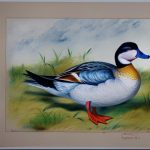The Nova Scotia Duck Tolling Retriever, also known as the Toller, is a medium-sized breed that originated in the early 19th century in the Little River District of Yarmouth County, Nova Scotia, Canada. The breed was developed to toll, lure, and retrieve waterfowl. The Toller is the smallest of the retrievers and is known for its distinctive red coat and playful nature. The breed’s history can be traced back to the 19th century when European sportsmen brought their hunting dogs to Nova Scotia. These dogs were bred with local retrievers and spaniels, resulting in the development of the Toller. The breed was officially recognized by the Canadian Kennel Club in 1945 and by the American Kennel Club in 2003.
The Nova Scotia Duck Tolling Retriever was originally bred to lure ducks within gunshot range and retrieve them from the water. The breed’s name “toller” comes from the Middle English word “tollen,” which means to lure. Tolling involves the dog playing and jumping along the shoreline to attract the attention of ducks, causing them to swim closer to shore. Once the ducks are within range, the hunter can then take a shot, and the Toller will retrieve the downed birds from the water. This unique hunting technique made the Toller an invaluable asset to hunters in Nova Scotia. Today, Tollers are still used for hunting, but they have also gained popularity as family pets and competitive sporting dogs. Their intelligence, agility, and friendly disposition make them well-suited for a variety of activities, including obedience, agility, and flyball.
Key Takeaways
- The Nova Scotia Duck Tolling Retriever originated in the early 19th century in Nova Scotia, Canada, where they were bred to lure and retrieve waterfowl.
- When looking for a breeder, it’s important to prioritize health, temperament, and breed standard in the Nova Scotia Duck Tolling Retriever.
- Health and genetic testing are crucial in breeding Nova Scotia Duck Tolling Retrievers to ensure the puppies are free from hereditary diseases and conditions.
- Ethical breeding practices for Nova Scotia Duck Tolling Retrievers include responsible breeding, proper socialization, and providing a healthy environment for the dogs.
- Socialization and training are essential for Nova Scotia Duck Tolling Retriever puppies to ensure they grow up to be well-adjusted and obedient dogs.
- Finding a reputable Nova Scotia Duck Tolling Retriever breeder involves research, visiting the breeder’s facilities, and asking for references from previous puppy buyers.
- When speaking with a Nova Scotia Duck Tolling Retriever breeder, it’s important to ask about health clearances, socialization practices, and the breeder’s involvement in the breed community.
Qualities to Look for in a Nova Scotia Duck Tolling Retriever Breeder
When looking for a Nova Scotia Duck Tolling Retriever breeder, there are several qualities to consider to ensure that you are getting a healthy and well-bred puppy. First and foremost, it is essential to find a breeder who is knowledgeable about the breed and is dedicated to preserving its integrity. A reputable breeder should be able to provide information about the breed’s history, temperament, and health considerations. They should also be able to answer any questions you may have about the breed and provide guidance on raising and training your Toller.
Another important quality to look for in a breeder is a commitment to health testing and genetic screening. Responsible breeders will conduct health tests on their breeding dogs to screen for genetic conditions that are common in the breed, such as hip dysplasia, progressive retinal atrophy, and autoimmune thyroiditis. They should be able to provide documentation of these tests and be transparent about the health of their breeding stock. Additionally, a good breeder will be selective about which dogs they choose to breed, ensuring that they are only breeding from healthy, well-tempered individuals with good conformation.
It is also important to find a breeder who prioritizes socialization and early training for their puppies. Puppies that are raised in a stimulating environment with plenty of human interaction and exposure to different sights, sounds, and experiences are more likely to grow up to be well-adjusted and confident adults. A good breeder will start this process early, exposing their puppies to different stimuli and providing them with positive experiences that will help them develop into well-rounded dogs. Finally, a reputable breeder will be committed to their puppies for life, offering support and guidance to new owners and being available to answer any questions or concerns that may arise throughout the dog’s life.
Health and Genetic Testing in Nova Scotia Duck Tolling Retriever Breeding
Health and genetic testing are crucial components of responsible breeding practices for Nova Scotia Duck Tolling Retrievers. Like all purebred dogs, Tollers are susceptible to certain genetic conditions that can be passed down from one generation to the next. To ensure the health and well-being of their puppies, reputable breeders will conduct health tests on their breeding dogs to screen for these conditions. Some of the most common health tests for Tollers include hip and elbow evaluations to check for dysplasia, eye exams to screen for progressive retinal atrophy, and thyroid testing to check for autoimmune thyroiditis.
In addition to these standard health tests, breeders may also choose to conduct genetic testing for specific conditions that are known to occur in the Toller population. For example, Tollers are known to be carriers of a genetic mutation that causes a condition called Collie Eye Anomaly (CEA). By testing their breeding dogs for this mutation, breeders can ensure that they are not producing puppies that are affected by this condition. Other genetic tests that may be recommended for Tollers include tests for Degenerative Myelopathy (DM), von Willebrand’s Disease (vWD), and Juvenile Addison’s Disease (JADD).
By conducting these health and genetic tests on their breeding dogs, responsible breeders can make informed decisions about which dogs to breed and help reduce the incidence of genetic conditions in the Toller population. They can also provide potential puppy buyers with information about the health of their breeding stock and offer reassurance that they are taking steps to produce healthy puppies. When looking for a Toller puppy, it is important to ask breeders about the health testing they have done on their dogs and request documentation of these tests.
Ethical Breeding Practices for Nova Scotia Duck Tolling Retrievers
Ethical breeding practices are essential for preserving the health and integrity of the Nova Scotia Duck Tolling Retriever breed. Responsible breeders adhere to a set of ethical guidelines designed to prioritize the well-being of their dogs and produce healthy, well-tempered puppies. One of the most important aspects of ethical breeding is selecting breeding stock that is free from hereditary health conditions. This involves conducting health tests on breeding dogs to screen for genetic conditions that are known to occur in the Toller population, such as hip dysplasia, progressive retinal atrophy, and autoimmune thyroiditis.
In addition to health testing, ethical breeders also prioritize proper socialization and early training for their puppies. Puppies that are raised in a stimulating environment with plenty of human interaction and exposure to different sights, sounds, and experiences are more likely to grow up to be well-adjusted and confident adults. Ethical breeders will start this process early, providing their puppies with positive experiences that will help them develop into well-rounded dogs. They will also be selective about where their puppies go, ensuring that they are placed in homes that are well-suited for the breed and have the resources to provide proper care.
Another important aspect of ethical breeding is transparency and honesty with potential puppy buyers. Reputable breeders will be open about the strengths and weaknesses of their breeding stock and will provide documentation of health testing and pedigrees upon request. They will also be available to answer any questions or concerns that potential buyers may have about the breed or their specific breeding program. By adhering to these ethical guidelines, responsible breeders can help ensure that future generations of Nova Scotia Duck Tolling Retrievers are healthy, well-tempered, and true to the breed standard.
The Importance of Socialization and Training in Nova Scotia Duck Tolling Retriever Puppies
Socialization and training are crucial components of raising a well-adjusted Nova Scotia Duck Tolling Retriever puppy. Early socialization involves exposing puppies to different people, animals, environments, and experiences during their critical developmental period, which is typically between 3 weeks and 3 months of age. Puppies that are well-socialized during this time are more likely to grow up to be confident, well-adjusted adults who are comfortable in a variety of situations. Socialization helps prevent fear-based behaviors such as aggression or anxiety and sets the stage for a lifetime of positive interactions with people and other animals.
In addition to socialization, early training is important for teaching puppies basic manners and obedience skills. Positive reinforcement training methods are recommended for Tollers as they respond well to praise and rewards. Training should begin as soon as you bring your Toller puppy home and should focus on teaching them basic commands such as sit, stay, come, and walking on a leash. Consistency and patience are key when training a Toller puppy as they can be independent thinkers who may test boundaries at times.
It is also important to provide mental stimulation for Toller puppies through interactive toys, puzzle games, and training exercises that challenge their problem-solving abilities. Tollers are intelligent dogs with a high level of energy, so providing them with outlets for mental stimulation can help prevent boredom-related behaviors such as chewing or excessive barking. Early socialization and training lay the foundation for a well-behaved adult Toller who is a joy to live with and can excel in various activities such as obedience, agility, flyball, or even hunting.
Finding a Reputable Nova Scotia Duck Tolling Retriever Breeder

Finding a reputable Nova Scotia Duck Tolling Retriever breeder requires research and careful consideration. One of the best ways to find a good breeder is through referrals from other Toller owners or breed clubs. Talking to people who have experience with the breed can provide valuable insights into different breeders’ reputations and breeding practices. Additionally, attending dog shows or events where Tollers are present can give you an opportunity to meet breeders in person and see their dogs firsthand.
When evaluating potential breeders, it is important to ask questions about their breeding program, including their goals for producing healthy puppies with good temperaments that adhere to the breed standard. A good breeder should be able to provide information about their breeding stock’s health testing results, pedigrees, and any titles or accomplishments they have achieved in conformation or performance events. They should also be willing to answer any questions you may have about the breed or their specific breeding program.
Visiting a breeder’s facility in person is also recommended so you can see how their dogs are housed and cared for. A reputable breeder will keep their dogs in clean, well-maintained facilities and provide them with proper veterinary care, nutrition, exercise, and socialization. They should also be open about any potential health or temperament concerns within their breeding program and be transparent about any challenges they may have encountered.
Finally, it is important to trust your instincts when choosing a breeder. If something feels off or if you have any doubts about a breeder’s practices or the condition of their dogs, it is best to continue your search elsewhere. A reputable breeder will be committed to producing healthy, well-tempered puppies and will be available to offer support and guidance throughout your Toller’s life.
Questions to Ask a Nova Scotia Duck Tolling Retriever Breeder
When considering a Nova Scotia Duck Tolling Retriever breeder, it is important to ask specific questions to ensure that you are getting a healthy and well-bred puppy from a reputable source. Some questions you may want to ask include:
1. What health tests do you conduct on your breeding dogs?
Responsible breeders will conduct health tests on their breeding dogs to screen for genetic conditions that are common in the Toller population such as hip dysplasia, progressive retinal atrophy, autoimmune thyroiditis, Collie Eye Anomaly (CEA), Degenerative Myelopathy (DM), von Willebrand’s Disease (vWD), Juvenile Addison’s Disease (JADD), among others.
2. Can you provide documentation of health testing results?
A good breeder should be able to provide documentation of health testing results for their breeding dogs upon request.
3. What is your socialization process for your puppies?
Ethical breeders prioritize proper socialization for their puppies by exposing them to different people, animals, environments, and experiences during their critical developmental period.
4. What titles or accomplishments have your breeding dogs achieved?
Reputable breeders often participate in conformation or performance events with their dogs as a way of demonstrating their breeding stock’s quality.
5. What support do you offer for new puppy owners?
A responsible breeder will be committed to their puppies for life, offering support and guidance to new owners throughout their Toller’s life.
By asking these questions and carefully evaluating a breeder’s responses, you can make an informed decision about where to get your Nova Scotia Duck Tolling Retriever puppy from a reputable source who prioritizes the health and well-being of their dogs.
You can also consider reaching out to local breed clubs or rescue organizations for recommendations on reputable breeders. Additionally, visiting the breeder’s facilities in person can give you a better sense of their practices and the living conditions of their dogs. Remember to trust your instincts and only work with a breeder who you feel comfortable with and who is transparent about their breeding practices. Ultimately, taking the time to find a responsible breeder will ensure that you bring home a happy and healthy Nova Scotia Duck Tolling Retriever puppy.
If you’re considering adding a Nova Scotia Duck Tolling Retriever to your family, it’s important to find a reputable breeder. The American Kennel Club (AKC) provides valuable resources for finding responsible breeders who prioritize the health and well-being of their dogs. In addition to choosing the right breeder, it’s also essential to provide proper nutrition for your pets. If you’re interested in learning more about the dietary needs of poultry, Poultry Wizard has an informative article on what vegetables quails eat. Understanding the dietary requirements of different animals can help ensure their overall health and happiness.
FAQs
What is an AKC Nova Scotia Duck Tolling Retriever breeder?
An AKC Nova Scotia Duck Tolling Retriever breeder is a breeder who is registered with the American Kennel Club (AKC) and specializes in breeding Nova Scotia Duck Tolling Retrievers, a medium-sized gundog breed known for its intelligence, agility, and ability to lure waterfowl within gunshot range.
What should I look for in an AKC Nova Scotia Duck Tolling Retriever breeder?
When looking for an AKC Nova Scotia Duck Tolling Retriever breeder, it is important to find a breeder who is registered with the AKC, follows ethical breeding practices, provides proper care and socialization for their puppies, and conducts health screenings for the parent dogs to ensure the puppies are healthy and free from genetic diseases.
How can I find a reputable AKC Nova Scotia Duck Tolling Retriever breeder?
To find a reputable AKC Nova Scotia Duck Tolling Retriever breeder, you can start by contacting the AKC for a list of breeders in your area. Additionally, you can ask for recommendations from local dog clubs, veterinarians, and other Nova Scotia Duck Tolling Retriever owners. It is important to thoroughly research and visit the breeder’s facilities before making a decision.
What questions should I ask an AKC Nova Scotia Duck Tolling Retriever breeder?
When speaking with an AKC Nova Scotia Duck Tolling Retriever breeder, it is important to ask about the health and temperament of the parent dogs, the breeding practices and socialization of the puppies, any health screenings conducted on the parent dogs, and the breeder’s experience and involvement in the breed community. Additionally, inquire about the breeder’s policies on puppy health guarantees, contracts, and support after the purchase.
What is the average cost of a Nova Scotia Duck Tolling Retriever from an AKC breeder?
The average cost of a Nova Scotia Duck Tolling Retriever from an AKC breeder can range from $1,500 to $3,000, depending on the breeder’s reputation, the lineage of the puppy, and the region. It is important to be cautious of breeders offering significantly lower prices, as it may indicate poor breeding practices or health issues.
Meet Walter, the feathered-friend fanatic of Florida! Nestled in the sunshine state, Walter struts through life with his feathered companions, clucking his way to happiness. With a coop that’s fancier than a five-star hotel, he’s the Don Juan of the chicken world. When he’s not teaching his hens to do the cha-cha, you’ll find him in a heated debate with his prized rooster, Sir Clucks-a-Lot. Walter’s poultry passion is no yolk; he’s the sunny-side-up guy you never knew you needed in your flock of friends!







